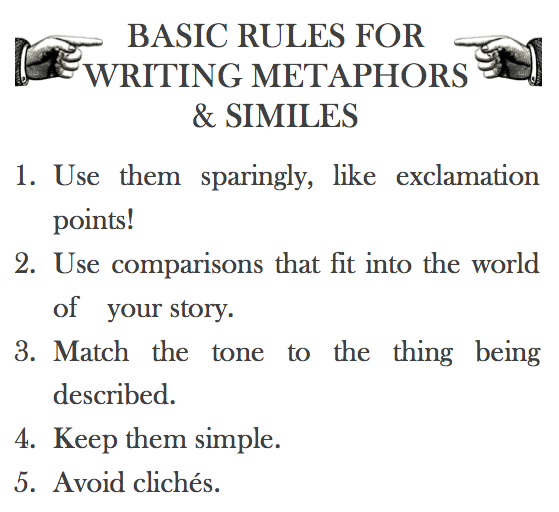If you’re a writer and you’ve thrown yourself into learning the craft, something is very likely to happen; armed with newfound knowledge of what makes a piece of writing great, you’ll realize that you'r writing… isn’t. You’ll see exactly what you’ve been doing wrong and you may very well not know what to do fix it and that obviously means you’re a terrible writer and just not cut out for this, right? Obviously not.
Read moreHow to Write a Query Letter
Writing your query letter, your goal is to make the reader want to pick up the book. That is the entire purpose. We’ve all recommended books to friends before. It’s exactly that… except now that book is yours and the stakes are high. A query letter is, above all, persuasive. While writing your query letter, make sure you draw your reader into your story with every word.
Read moreBasic Rules for Writing Metaphors and Similes
RULE #1: USE THEM SPARINGLY. Elevating every single description is like ending each sentence with an exclamation point. Eventually, the reader decides no one could possibly shout this much, and starts ignoring them.
Read moreWorld Building (With a Worksheet!)
World building even sounds simple. The sort of thing you can do on a lunch break at work, or on your way home from class. It’s just… building a world, right? An entire one? Full of people and customs and architecture and stories and holidays and types of grass and—okay, that’s a little overwhelming. At least, it can be, when you barely know where to start.
Because the thing is, world building isn’t as terribly scary as it sounds. Once you’ve you’ve set down a few foundation stones, it can be pretty simple to build on top of those.
Read moreHow to Write a Novel Synopsis
A synopsis is a 1-2 page summary of the events that transpire in a book, either proposed or already written. It’s used to give people who haven’t read your book a quick overview, so they know the story that’s being told in the book without having to read it.
Read moreAn Introduction to Writing Workshops
If you want to study creative writing–whether in high school, college, or outside of a typical school setting–you’ll undoubtedly find yourself in a workshop.
Writing workshops can vary wildly, but the basic premise is this: one writer shares their work and silently listens as a room full of other writers judge it.
Depending on the instructions the people in that room are given, their experiences with work-shopping, and their own writing know-how, workshops can either be be scary, unhelpful, humiliating, and downright depressing, or amazing experiences that fundamentally improve your ability to write.
Read moreHow to Pitch Your Novel in 30 Seconds
One of those things every author needs to learn to do at some point or other is give what’s called an “elevator pitch.” Most elevator pitches aren’t actually given in elevators. They’re given at networking events, in bookstores, to friends and family, during Twitter contests, and basically whenever anybody asks “so what is your book about?” Usually the person you’re speaking to won’t be waiting for the doors to open so they can escape, but the ability to quickly spark someone’s interest in your story is invaluable.
Read more





